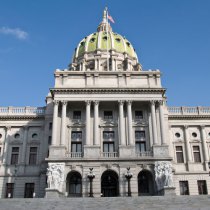Subscribe for Weekly Updates

The Show Must Go On: A Preview of the 2017-2018 Legislative Session
By Peter N. Calcara, vice president - government relations
On Jan. 3, 2017, the 201st session of the Pennsylvania General Assembly got under way on the date prescribed in the Pennsylvania Constitution – the first Tuesday of January following the November election. Surrounded by family, friends, and key political supporters, 223 of the 253 members of the state House and Senate took the oath of office, thereby starting what we fully expect to be a challenging and contentious 2017-2018 legislative session.
The first order of business for the new session was to elect the leaders of each chamber. It was no surprise that Sen. Joseph Scarnati (R-Jefferson) and Rep. Mike Turzai (R-Allegheny) were once again unanimously elected by their colleagues as President Pro Tempore of the Senate and Speaker of the House, respectively. Scarnati has held the post since 2007; Turzai was first elected speaker in 2015.
 The PICPA welcomed two new CPAs to the profession’s growing ranks in Harrisburg. Rep. Michael Corr, CPA (R-Montgomery), and Rep. Frank Ryan, CPA (R-Lebanon), join returning lawmakers Rep. John Maher, CPA (R-Allegheny), Rep. Mike Peifer, CPA (Inactive) (R-Pike, Wayne), Rep. George Dunbar, CPA (Inactive) (R-Westmoreland), and Rep. Keith Greiner, CPA (R-Lancaster), along with Sen. Pat Browne, CPA (R-Lehigh), to form Pennsylvania’s “CPA Caucus.” Rep. Maher continues to chair the House Environmental Resources and Energy Committee, and Sen. Browne chairs the Senate Appropriations Committee.
The PICPA welcomed two new CPAs to the profession’s growing ranks in Harrisburg. Rep. Michael Corr, CPA (R-Montgomery), and Rep. Frank Ryan, CPA (R-Lebanon), join returning lawmakers Rep. John Maher, CPA (R-Allegheny), Rep. Mike Peifer, CPA (Inactive) (R-Pike, Wayne), Rep. George Dunbar, CPA (Inactive) (R-Westmoreland), and Rep. Keith Greiner, CPA (R-Lancaster), along with Sen. Pat Browne, CPA (R-Lehigh), to form Pennsylvania’s “CPA Caucus.” Rep. Maher continues to chair the House Environmental Resources and Energy Committee, and Sen. Browne chairs the Senate Appropriations Committee.
Republicans hold commanding majorities in both chambers – a veto-proof margin of 34-16 in the Senate and 121-81 in the House. There is one vacancy in the House due to the resignation on Jan. 3 of Rep. Leslie Acosta (D-Philadelphia) because of a guilty plea to federal charges last March. A special election will be held to fill her seat. Committee chairs have been selected in both chambers, but complete rosters won’t be available until later this month. For a complete list of committee chairs, check out the latest PICPA Legislative Update.
Gov. Tom Wolf will deliver his budget address to a joint session of the General Assembly on Feb. 7, which will officially begin the budget process for the new fiscal year that starts July 1. Wolf has already publicly taken broad-based tax increases off the budget negotiating table, but don’t take that as a sign that the collegiality that marked most of the 2016-2017 budget process will carry over to this year. With state finances seemingly growing more dire as each month passes and a gubernatorial election in the not-to-distant future (2018), this year’s budget process could look more like 2015’s protracted stalemate than last year’s tame negotiations.
There’s no denying that fiscal issues will be a challenge this year. The Pennsylvania Department of Revenue (DOR) reports that General Fund revenue collections for the month of December were $105 million less than expected, bringing the fiscal year-to-date collections at $367 million below official estimates. Collections of $467 million for corporation taxes came in below DOR projections by $43 million. Sales tax collections of $841 million were lower than expected, coming in $11 million short of the official estimate. The personal income taxes collected were $962 million, which was below estimate by $45 million.
In its annual economic and budget outlook report released this past November, the Independent Fiscal Office reports that Pennsylvania is facing a projected $600 million deficit for the current fiscal year and a potential $1.7 billion deficit in the 2017-2018 fiscal year.
In December, Randy Albright, Wolf’s secretary of the Office of the Budget, gave his midyear budget briefing. There was little in the way of good news in the secretary’s report. Current projections show that Pennsylvania will end the 2016-2017 fiscal year with a $604 million deficit. The administration expects revenue collections will end $425 million under estimate. Additionally, the $604 million deficit includes $183 million in supplemental appropriations that the Office of the Budget is projecting will be needed.
The midyear briefing outlined other challenges for next year’s budget, including the state’s growing pension and debt obligations, $304 million and $133 million, respectively, human service cost increases because of lower payments from the U.S. government, rising health care costs, and a rapidly growing senior population that will consume more services.
On top of budget and related matters, there are a host of other major issues that will grab legislators’ attention in the early part of 2017. These include addressing the $60 billion unfunded state pension liability crisis – which the PICPA has been calling for since the release of its 2011 Fiscal Responsibility Tax Force report, eliminating school property taxes (read “sales tax on professional services”), fixing the casino local-share issue, funding for unemployment compensation call centers, and charter school reform, just to mention a few. State legislators will find no shortage of major issues in Harrisburg this year.
The PICPA government relations team is ready to represent our 22,000 members and to be the voice of the CPA profession in Pennsylvania. Located just across the street from the state capitol, the government relations team and PICPA’s major standing committees – State Taxation, Local Government Auditing and Accounting, and Legislation – will play a significant role in assisting state lawmakers with the fiscal and other public policy challenges that lay ahead in the new year.







Leave a commentOrder by
Newest on top Oldest on top